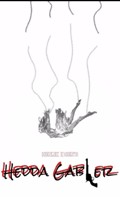The Bench Production

This play was staged at The Spring Arts and Heritage Centre (formerly Havant Arts Centre), East Street Havant - Bench Theatre's home since 1977.
Cast
| Hedda Tesman/ Gabler | Katie Watson |
| George Tesman | Chris Davey |
| Juliana Tesman | Sue Dawes |
| Thea Elvsted | Frances Peters |
| Judge Brack | Steve Burt |
| Eilert Loevberg | Stuart Riley |
| Berthe | Angie McKeown |
| Ensemble | Julie Wood, Jeff Bone, Ben Tanner, Suzy Gains |
Crew
| Director | Archie McKeown |
| Assistant Director/Producer | Jacquie Penrose |
| Stage Manager | Tasmin Halford |
| Assistant Stage Manager | Alan Welton |
| Lighting and Sound Design | Phil Hanley |
| Lighting Operation | Phil Hanley |
| Sound Operation | Phil Hanley |
| Flyer Design | Dan Finch |
| Costumes | Archie McKeown, Jacquie Penrose |
| Set Design | Archie McKeown, Jacquie Penrose |
| Set Construction | Julie Wood |
| Programme Editor | Derek Callam |
| Photography | David Penrose |
Director's Notes
Thanks for supporting this production of Hedda Gabler. When I pitched Hedda, I don't know that I had actually considered reaching this stage. Directing is considerably harder than I initially thought… especially when combining with second year A level studies!
I have been fortunate enough to work with an incredibly strong group of people who have helped bring my vision to life. All the cast and crew have been hardworking, innovative, and great fun in rehearsals and I can't thank them enough for their many contributions.
It would be impossible to single out individual members of the cast as they are all so strong. However, I would like to thank the Physical Ensemble as they have been crucial in creating the atmosphere for this production. Their role sets the tone - elevating Ibsen's words to intensify the claustrophobia Hedda feels, embodying both her, and her fears, of oppression, scandal and the inescapability of her dire circumstances. Whilst also appreciating the humour of a moon-walking fire!
I also need to especially thank Jacquie Penrose - my assistant director - who inducted me into the Bench with Twelfth Night last year and has offered me so much support over the past few months. Helping to shape these characters and the production you see today.
We really hope you like it!
Archie McKeown (Director)
Reviews
The NewsJames George
Seventeen-year old Archie McKeown is directing The Bench's latest offering, Ibsen's classic Hedda Gabler, at The Spring over the next two weeks.
And McKeown is a man clearly chock-full of interesting theatricality, most noticeably in the introduction of a black-clad ensemble, used to comment on the action of the play and – on occasion – to join in. On opening night I wished more courage-in-conviction from the director; if using an ensemble – use them more! The actors occasionally appeared clunky add-on rather than intrinsic part of the action.
As the eponymous anti-heroine, Katie Watson conveys Hedda's frustration with small-town life beautifully, but needs to focus on Ibsen's subtext and live the situation rather than demonstrating it. This was particularly obvious in her conversation with an unknowing Thea (Frances Peters) about Hedda's previous relationship with the writer, Loevborg. That said, her confrontation with the sleazy judge (Steve Burt) in which she realises she is, effectively, his slave was very nicely handled. And as Loevborg, Stuart Reilly really gets the measure of Ibsen's difficult text and convincingly presents us with a soul equally as troubled as Hedda's. This is the stand-out performance of the evening, with Reilly making believable choices in his portrayal and playing them effectively.
Read more at: https://www.portsmouth.co.uk/whats-on/theatre/review-hedda-gabler-at-the-spring-arts-centre-in-havant-1-8458326